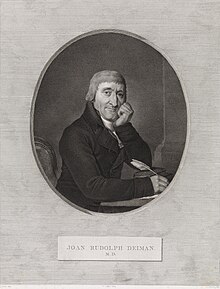Johan Rudolph Deiman
Johan Rudolph Deiman (also: Johann Rudolf Deimann ; born August 29, 1743 in Hage ( East Friesland ), † January 15, 1808 in Amsterdam ) was a German-Dutch physician and chemist .
Life
Deiman was born the youngest of five children of the Hager procurator Albertus Deiman and his wife Volke Hiddes. He first went to school in the north . When he was fourteen years old, his father died. With the support of the two oldest brothers, he completed a pharmaceutical apprenticeship in Leer . He studied pharmacy, medicine and philosophy in Halle with Adolph Böhmer. In 1770 Deiman started his own business as a doctor in Amsterdam . In a few years he made his way up in society. He was particularly known for inoculating the leaves .
In 1775 he went public with a Dutch translation of the work on magnets published by his contemporary, the doctor, naturalist and poet Johann Christoph Unzer . A year later he delivered the translation of a French medical treatise on the tapeworm. In 1778 he presented the result of the experiments carried out jointly with the businessman and chemist Adriaan Paets van Troostwijk on the influence of light on plants and trees, a work that was awarded a prize by the Utrecht Society of Arts and Science. It appeared in print in Amsterdam two years later. His treatise on the effects of electricity on various substances had been published the year before. A similar work had already earned him a gold medal from the Rotterdam Society for Experimental Physics.
With three other Dutch chemists (Adriaan Paets van Troostwijk, Anthonie Lauwerenburgh and Nicolaas Bondt ) he produced 1,2-dichloroethane (oil of the Dutch chemists, see ethene ). With Paets van Troostwyck in 1789 he split water with the help of static electricity.
In 1783 he became a member of the Hollandse Maatschappij der Wetenschappen te Haarlem. He was also a member of various scientific societies in Paris , Haarlem and Rotterdam .
Deiman also became known as the personal physician of the then King Ludwig Napoleon of Holland , a brother of Napoleon Bonaparte .
His brother Johann Diederich Deimann was a well-known Dutch preacher.
Works
- Negotiating over het nut van den groei der Boomen en Planten tot zuivering der Lucht , Amsterdam 1780;
- Waarnemingen omtrent der Verbetering der Lucht , door middel van den groei der planten , in: Mengelwerk der Hedend. Vaderl. Letteroeff. 7, 1778, pp. 338-349;
literature
- IC Editions and IG Gruber (eds.): General Encyclopedia of Sciences and Arts. First Section A – G, Leipzig, 1832;
- JE Doornik: Johann Rudolph Deiman thought. Amsterdam 1808;
- HPM van der Hornvanden Bos: Jan Rudolph Deiman in: Album der Natuur, 1886;
Individual evidence
- ^ Hermann Kopp , History of Chemistry, Volume 2, Vieweg 1844, p. 329
Web links
| personal data | |
|---|---|
| SURNAME | Deiman, Johan Rudolph |
| BRIEF DESCRIPTION | German-Dutch physician and chemist |
| DATE OF BIRTH | August 29, 1743 |
| PLACE OF BIRTH | Hage , East Frisia |
| DATE OF DEATH | January 15, 1808 |
| Place of death | Amsterdam |
